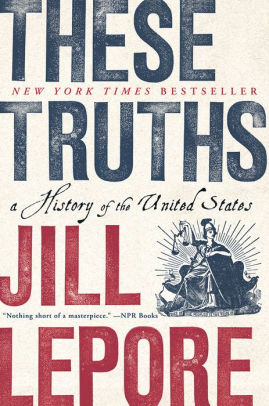
All general surveys of the history of the United States of America mention radio to some extent. Invariably Pittsburgh station KDKA’s pioneering coverage of the presidential election of 1920 receives a context-free mention, followed by a rundown of notable ‘golden age of radio’ shows. With that, the author(s) typically put the medium to bed until several chapters later, when the obligatory discussion about television ensues. I expected more or less the same from Jill Lepore’s noted overview These Truths: A History of the United States. Instead I found a deep discussion about the subject that every media history lover should read.
Chapter eleven of These Truths is titled “A Constitution of the Air,” and begins with a profile of the founder of broadcast regulation: Herbert Hoover. “Nothing so well illustrated [Hoover’s] idea of a government-business partnership as radio,” Lepore writes, “an experimental technology in which Hoover, a consummate engineer, invested the hope of American democracy.” As secretary of commerce Hoover rounded up all the major players in radio for a series of conferences because he understood that broadcasting would make governing “an intimate affair.” Soon politicians would be able to reach into the homes of millions of Americans without bothering to visit them. Broadcasting, Hoover fervently believed, would turn the country into “literally one people.”
Lepore situates broadcast radio at the center of the enormous optimism of the 1920s. “We shall soon with the help of God be in sight of the day when poverty will be banished from the earth,” Hoover declared as he ran for president in 1928. He was on hand on October 21, 1928 to celebrate the fiftieth birthday of Thomas Edison’s incandescent light bulb. But as the festivities went on, “news came by radio that shares on the New York Stock Exchange had begun to fall,” Lepore writes. “It was as if a light, too brightly lit, had shattered.”
The rest of the chapter beautifully narrates the Great Depression and New Deal years, constantly identifying radio as a witness to and participant in the era. Hoover’s irony was that while he understood the importance of AM broadcasting, he did not know how to use it. As the economy collapsed, he read scripts over the airwaves in a “dreadful monotone.” Intended to reassure Americans, they conveyed the opposite. It fell to his successor, Franklin Roosevelt, whose bout with polio had taught him the meaning of suffering, to effectively embrace the medium. “His acquaintance with anguish changed his voice:” Lepore explains, “it made it warmer.”
Again and again, Lepore brings us back to broadcast radio and its partnership with globe changing events: Nazi Minister of Propaganda Joseph Goebbels launching a massive manufacturing of radio sets to reach every German home. “Mind-bombing,” Goebbels called his campaign. Fire breathing populists like Father Charles Coughlin and Louisiana Senator Huey Long selling their anti-semitism and economic cure-all plans over the airwaves. In response, NBC launched America’s Town Hall Meeting of The Air, which sponsored debates and aimed to “break radio listeners out of their political bubbles,” in Lepore’s words. Across the nation more than 1,000 debating clubs staged their own mini-versions of Town Hall’s discussion of the week. All this faded away as the next world war loomed, its coming foretold over shortwave radio by CBS correspondent H.V. Kaltenborn, he narrating the Munich Crisis of 1938. Meanwhile Czechoslovakia radio broadcasters battled Nazi propaganda. “Once again tonight we must perform the distasteful task of refuting invented reports broadcast by the German wireless station,” one news anchor declared.
I wish that ‘Constitution of the Air’ had not concluded with a conventional account of Orson Welles’ famous broadcast of The War of the Worlds. I am convinced by scholars Jefferson Pooley and Michael J. Socolow that the “panic” over the broadcast is largely mythological, exaggerated by newspapers anxious to convince advertisers that radio could not be trusted. Still, I was moved by Lepore’s final passage, describing Kristallnacht, the Nazi assault on Germany and Austria’s Jewish population:
” . . . ‘This is not a Jewish crisis,’ wrote Dorothy Thompson. ‘It is a human crisis.’ It was as if the sky itself had shattered.
From the White House, [President Franklin] Roosevelt said he ‘could scarcely believe that such things could occur in a twentieth-century civilization.’ It was indeed difficult to believe. But a war of the worlds had begun.”


